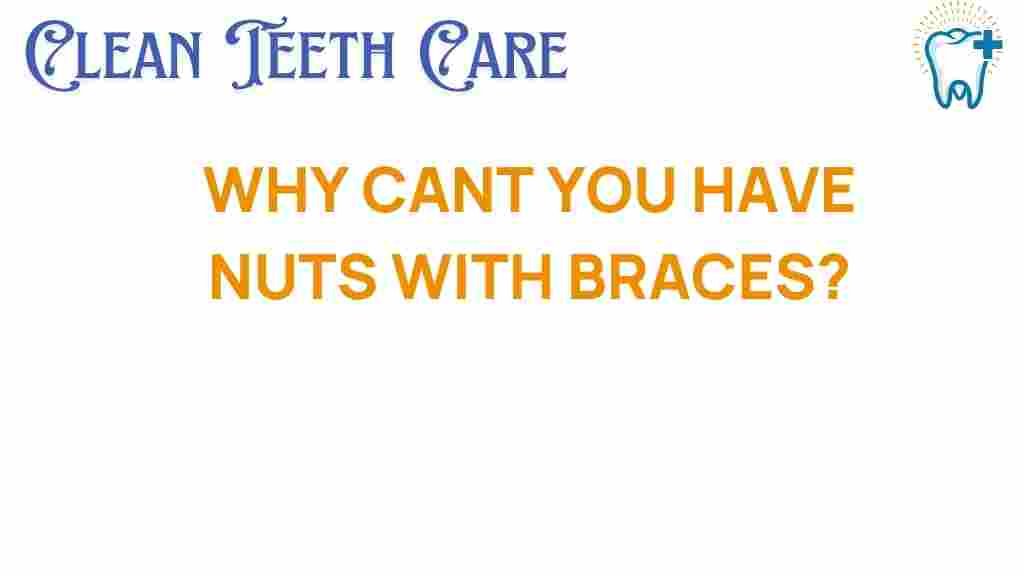The Hidden Dangers of Nuts for Those with Braces: What You Need to Know
Braces are a common orthodontic treatment used to align teeth and correct bite issues. While undergoing orthodontic treatment, it’s crucial to be mindful of your diet to ensure optimal oral health and the success of the treatment. One food group that often raises concerns among patients with braces is nuts. In this article, we will explore the hidden dangers of nuts for those with braces, discuss food restrictions, and provide you with essential tips for maintaining your dental care during orthodontic treatment. Understanding how nuts can impact your braces will help you make informed choices about your diet.
Understanding Braces and Their Impact on Your Diet
Braces work by applying continuous pressure to your teeth over time, which gradually moves them into the desired position. This process requires patience and careful attention to your dental care. The brackets, wires, and bands used in braces can be sensitive to certain foods, making it essential to avoid hard or sticky items that can damage the orthodontic appliances.
Why Nuts Can Be Problematic
Nuts are often considered a healthy snack, packed with protein and essential nutrients. However, when it comes to braces, they pose several risks:
- Hard Texture: Nuts can be very hard, and biting down on them can cause brackets to break or wires to bend, prolonging your treatment time.
- Sticky Residue: Some nuts, particularly those that are roasted and salted, can leave a sticky residue that may get lodged in between the brackets and wires.
- Chewing Challenges: Chewing nuts can put unnecessary strain on your teeth and orthodontic appliances, leading to discomfort or even injury.
Food Restrictions During Orthodontic Treatment
Managing food restrictions is a critical aspect of maintaining oral health during orthodontic treatment. Here are some common restrictions you should consider:
- Avoid Hard Foods: Foods like hard candies, ice, and nuts can damage braces.
- Steer Clear of Sticky Foods: Caramel, taffy, and certain nut blends can stick to braces and be difficult to clean.
- Limit Sugary Foods: Sugary items can contribute to plaque buildup, leading to cavities and gum disease.
Maintaining Oral Health with Braces
To ensure proper dental care while wearing braces, follow these essential tips:
- Brush Regularly: Brush your teeth at least twice a day, focusing on cleaning around brackets and wires.
- Floss Daily: Use a floss threader or orthodontic flosser to remove food particles stuck between your teeth.
- Use Mouthwash: Rinse with an antimicrobial mouthwash to help reduce plaque and keep your mouth fresh.
Step-by-Step Process for Eating with Braces
If you’re unsure about what to eat while wearing braces, here’s a simple step-by-step process to follow:
- Plan Your Meals: Focus on softer foods that are easy to chew. Opt for fruits like bananas and applesauce, vegetables like steamed carrots, and proteins like yogurt and eggs.
- Prepare Your Snacks: Instead of nuts, consider alternatives like soft cheese, hummus, or smoothies. These options are nutritious without the risk of damaging your braces.
- Practice Good Chewing Habits: When you do eat, take small bites and chew slowly to minimize pressure on your braces.
- Stay Hydrated: Drink plenty of water to help wash away food particles and keep your mouth clean.
Troubleshooting Common Issues with Braces
Even with the best intentions, issues can arise during orthodontic treatment. Here are some troubleshooting tips:
- Loose Bracket: If a bracket becomes loose, avoid hard foods and contact your orthodontist for repairs.
- Discomfort or Pain: It’s normal to experience some discomfort after adjustments. Over-the-counter pain relief can help.
- Food Stuck in Braces: Use a soft toothbrush or an interdental brush to remove stubborn food particles.
The Importance of Regular Orthodontic Checkups
Your orthodontist plays a vital role in your treatment. Regular checkups allow your orthodontist to monitor your progress, make necessary adjustments, and address any issues that arise. Be sure to attend all scheduled appointments and communicate any concerns about your braces or diet.
Conclusion: Making Informed Choices for Your Oral Health
Nuts may be a healthy snack for many, but for those with braces, they can pose significant risks to your orthodontic treatment and oral health. Understanding the hidden dangers of nuts and adhering to food restrictions is essential for ensuring your braces function effectively and your teeth remain healthy. By following proper dental care practices and opting for softer food alternatives, you can navigate your orthodontic journey with confidence. Always consult with your orthodontist regarding any dietary concerns or if you’re unsure about specific foods.
For more information on dental care and maintaining oral health during orthodontic treatment, visit this resource. If you want to learn more about braces and how they affect your diet, check out this guide.
This article is in the category Treatments and created by CleanTeethCare Team
